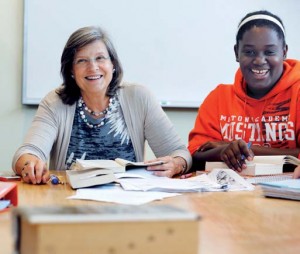 Maria Gerrity, English Department
Maria Gerrity, English Department
Member of the Faculty, 1998–2015
Young teachers hope to launch a career with curiosity and authenticity; mid-career teachers yearn to balance work and family; and veterans earn gravitas. We are here to celebrate Maria Gerrity, who has played every melodious note on just such an ascending scale of a school career. Her 20-year arc at Milton has been backlit by her natural, easy way with her students and colleagues, an ease that has always invited us to learn and laugh genuinely.
Before she set foot on Milton’s campus, Maria’s teaching career was well under way. From college she leapt into a master’s program followed by two years at Shady Hill, two years in Boston’s Head Start Program, and then five years at Nightingale-Bamford in New York. These were the early years that can test young teachers, but Maria’s aplomb kept her churning through diverse posts such as first grade, seventh-grade homeroom, and Russian lit in translation with seniors. One day when she visited another school to offer a presentation on Central Park, Maria’s host left her with his students but never returned! So, naturally, she improvised and began teaching his class for him — “Take out your spelling books!” — and no one was the wiser.
In 1990, Maria came to Milton, alma mater of husband Daniel (’66), for her daughter Sheffie’s Grade 7 interview. That day she caught a glimpse of future colleagues and friends whose confident warmth felt so familiar. Maria remembers that Jane Brewer immediately “acted as if we’d be best friends in the world,” an observation most prescient — they’re fast friends to this day. In the following years, as she puts it, “one thing dribbled into another”: seventh-grade social studies, then admissions, then the English department in 1995, after Carly Wade mentioned to David Smith that he had a real pro in his midst. When Vera and Sam came to Milton in 1996 and 1998, Maria may have been tempted to lighten her workload, but she leaned into more responsibility, teaching cornerstone classes such as Class IV English, the Human Condition, and Founding Voices. If pressed to teach one book above them all, she would choose Paradise Lost for, more than anything, its beautiful language that recalls her father’s spontaneous recitations of poetry through her childhood. In time, Maria’s practice came to hold a simple line of focus: Be flexible; avoid any pretense that you know everything; and get classes “to ask the important questions.” Later generations of students would enjoy such hard-won wisdom during her star turn as a class dean from 2004–2011 — if you’re playing at home, that adds up to about a thousand assembly check-ins and about a billion hours with students in her office munching on her well-stocked candy jar. Ultimately, Maria remembers how that balance of family and school careened wildly, yes, but she returns to a simple refrain — “I have been very lucky” — to describe how Milton enriched her life, and she in it found a place to devote herself.
As for gravitas, Doug Fricke in his 2009 class observation framed our esteem of Maria best: “The longer we teach in one place, the more we realize the value of good colleagues, the folks we bump into every day . . . Collegiality delights and instructs us . . . I’m sure all my colleagues in English join me in saying, “Thank God for Maria!” He continues: “She is always present: an incisive and wise mind, an ear for jokes and complaints, a voice of often hilarious stories, a keen eye for trouble, a helping hand, a big heart . . . There is, quite simply, no end to her generosity and good will.” Maria, we will miss you dearly.
by Tarim Chung
English Department Chair



